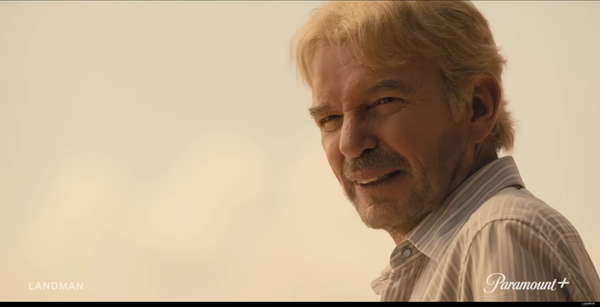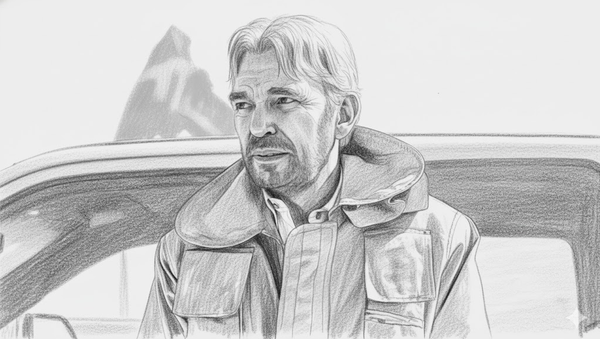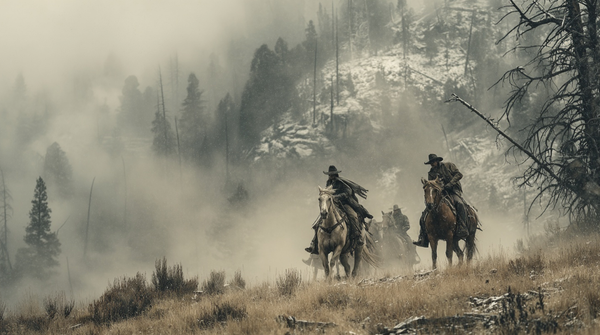The Marshal on the Horizon: Mamie Fossett and the Forging of a New Law in 1923
Jennifer Carpenter’s arrival in Taylor Sheridan’s West signals more than a new character. It introduces a new, unyielding force of order, set to collide with the land, the gods, and the dynastic justice of the Dutton family.

I. A New Archetype in a Mythic Land
In the vast, brutal theater of Taylor Sheridan’s American West, womanhood has been defined by the landscape. It is Cara Dutton (Helen Mirren), the matriarch-as-fortress, her will as unyielding as the Montana winter, her justice rooted in the preservation of family and soil. It is Alexandra (Julia Schlaepfer), the adventurer-as-aristocrat, who sheds the skin of Old World civility to embrace the raw, romantic peril of a life with a hunter on the African plains. It is Teonna Rainwater (Aminah Nieves), the survivor-as-avenger, a force of nature reclaiming her identity from the genocidal machinery of the state. These are women forged by circumstance, their power intrinsically linked to their roles as protectors, partners, and rebels.
And then, coming over the horizon, is Mamie Fossett.
Her arrival in the second season of 1923, embodied by an actress who has built a career on portraying brilliantly complex women crackling with intelligence and righteous fury, signals a seismic shift. Jennifer Carpenter does not enter a role quietly. As television audiences learned over eight seasons of Dexter, she possesses a singular ability to project a fierce, almost agonizing internal struggle between duty and morality, between the letter of the law and the chaotic pull of the human heart. Her Debra Morgan was a masterclass in controlled chaos, a woman whose strength was inseparable from her vulnerability. To bring an actress of this caliber into the world of 1923 is not merely casting; it is a statement of intent.
Mamie Fossett is not defined by the land she stands on, nor the man she stands beside. She is defined by the badge she wears and the code she carries within her. As a U.S. Deputy Marshal from Oklahoma, she is an outsider, an agent of a federal authority that, in the isolated valleys of Montana, feels as distant and abstract as the moon. She is not a guardian of legacy or a seeker of love; she is an instrument of the law—a law that promises to be colder, more impartial, and far more relentless than the frontier justice of the Duttons. Her presence is not an addition to the existing power structure; it is a direct challenge to its very foundation. She is the coming storm, and her story promises to be a trial by fire for everyone in her path.
II. The Weight of a Real Badge
What separates Mamie Fossett from the mythic figures populating Sheridan’s West is the anchor of history. Her character is not pure fiction; she is inspired by the real, trailblazing female marshals who brought the law to some of America’s wildest territories. This grounding in historical fact immediately imbues her with an authority that other characters must earn through violence or legacy. She is not playing at being a lawman; she is the law, a living representative of a progressive, if often flawed, national project.
In the early 20th century, female law enforcement officers were pioneers, navigating a world of profound sexism and institutional skepticism. They succeeded not through brute force, but through intelligence, unyielding resolve, and a profound understanding of human nature. By rooting Mamie in this reality, the showrunners grant her an immediate gravitas. Her assertive presence, as seen in the promotional still, is not just a costume; it is the uniform of a survivor, a professional who has earned her place in a world designed to exclude her.
Her jurisdiction as an Oklahoman marshal is a crucial detail. Unlike the local sheriff, who is enmeshed in the intricate web of loyalties and feuds that define Dutton country, Mamie answers to a higher, more remote power. She is, as the provided intelligence suggests, possessed of “an independent sense of justice, not swayed by outside influence.” This makes her uniquely dangerous to every faction. She cannot be bought by Banner Creighton’s money, intimidated by the Duttons’ power, or manipulated by the Church’s veneer of piety. Her allegiance is to the statutes in her law book, a text that makes no distinction between a cattle baron and a sheepherder. She is an auditor arriving to inspect a company whose books have been cooked for generations, and she is immune to the local customs of corruption and compromise.
III. The Unholy Alliance: A Hunt for Truth in a Conspiracy of Lies
The narrative engine for Mamie’s introduction appears to be the hunt for Teonna Rainwater. Yet, she is not hunting alone. Her stated partners in this endeavor—Marshal Kent and Father Renaud—form an alliance as precarious and combustible as a stick of dynamite. It is a triumvirate of conflicting motives, destined to implode.
Father Renaud, the architect of the boarding school’s horrors, is not seeking justice; he is seeking vengeance and containment. His goal is to silence a witness, to punish a runaway who dared to defy his authority, and to bury the evidence of his institution’s crimes. For him, the hunt for Teonna is an act of self-preservation, cloaked in the language of righteousness. Marshal Kent, likely representing the local, more pliable arm of the law, exists in a space of potential compromise, susceptible to the pressures of the powerful forces that govern Montana.
Into this den of lions walks Mamie Fossett. While their shared, official goal is the capture of a fugitive, her personal mission will inevitably become the pursuit of the truth. As a seasoned investigator with a sharp, independent mind, she will quickly discern that the official story is a fabrication. The terrified whispers, the missing records, the sheer, unholy terror in the eyes of anyone connected to that school—these are the breadcrumbs that will lead her away from her partners and toward a different conclusion: that Teonna is not the perpetrator, but the victim.
This will be the crucible in which Mamie’s character is forged. How does an officer of the law operate when her own allies are obstructing justice? When the institution they are sworn to protect is the source of the crime? This is where Jennifer Carpenter’s talent for portraying internal conflict will shine. We will watch Mamie navigate a treacherous path, maintaining the facade of cooperation while conducting her own clandestine investigation. Her greatest struggle will not be against the outlaws she pursues, but against the supposed lawmen at her side. Her independent sense of justice will inevitably set her on a collision course with her partners, transforming a manhunt into a moral chess match where her own life is at stake.
IV. The Dutton Confrontation: When the Old Law Meets the New
The most anticipated flashpoint, as confirmed by a tantalizing look ahead, is the direct confrontation between Mamie Fossett and the returning Spencer Dutton. This is more than a meeting of two characters; it is a symbolic showdown between two Americas.
Spencer Dutton is the living embodiment of the 19th-century frontier ethos. He is a man shaped by the trauma of war and the solitude of the wilderness, whose moral code is forged in survival. For a Dutton, justice is a private matter, a right earned through blood and defended with righteous violence. Their law is the law of the brand, the law of the family, the law of the land they claimed and bled for. Spencer, the family’s prodigal son and most lethal warrior, is the ultimate enforcer of this old-world covenant.
Mamie Fossett represents the 20th century, the ascendant power of the centralized state, and the promise of a unified, impartial rule of law. Her authority does not come from a bloodline or a parcel of land, but from a federal government in Washington D.C. She is the agent of a world where the personal vendettas of powerful families are meant to be superseded by a common legal code.
Their inevitable clash will force a reckoning. Whether their conflict arises over Teonna’s fate or a separate Dutton transgression, it will compel Spencer to confront a difficult truth: the tactics that built his family’s empire may be the very thing that brings it down in a changing world. A fistfight with a sheepherder is one thing; obstructing a U.S. Deputy Marshal is another entirely. For her part, Mamie will face her greatest test. Is her federal authority, her “new law,” powerful enough to hold a force like the Duttons accountable? Or will she discover, as so many have before her, that in the remote canyons of Montana, the law is whatever the man with the most guns says it is? This confrontation will be a negotiation, under threat of violence, over the very definition of justice in America.
V. The Carpenter Standard
Ultimately, the introduction of Mamie Fossett, brought to life by Jennifer Carpenter, promises to elevate the entire dramatic project of 1923. She will offer a new definition of strength, one that is not contingent on patriarchal power or romantic destiny. Her toughness will be intellectual, her courage moral, her resilience procedural. She will be a woman whose power lies in her refusal to be intimidated, her unwavering focus on the facts, and her lonely, dogged pursuit of a truth that everyone else wants to bury.
Her journey will likely not be one of triumphant victory, but of profound struggle. But in that struggle, she will act as the series’ conscience, a new moral compass pointing true north in a world of shifting allegiances and convenient truths. She is the law, coming to a lawless land, and nothing will be the same.



